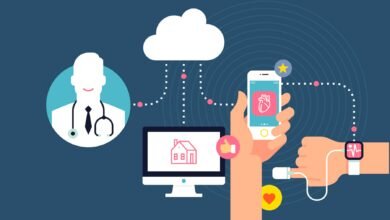Using IoT to Improve Elderly Care

As people worldwide live longer, it’s important to consider how to care for older people in the long run. According to data from the UN, the population is getting older. Since 2010, the number of people over 65 has been rising faster than ever, no matter how rich or poor a country is.
As life expectancy grows by almost eight years, studies show problems that must be solved. This is why governments worldwide are putting more money into the IoT for projects that need to be done quickly. The goal is to make towns better places to live and meet the needs of their older and more senior citizens.
Adding IoT is meant to make public spaces, transportation, homes, and other things better. We talk about some of the most important ways that IoT solutions have improved and will continue to improve care for the elderly.
Related: How IoT in Healthcare is Revolutionizing the Medical Industry in Germany
IoT for Elderly Care
Increase Overall Convenience
IoT gadgets that are smart and connected can make people’s lives easier in many ways, especially for seniors. Using a smartphone or fridge, for example, can make it easy to buy food. By connecting these two interfaces, the buying process can be done automatically when stock is low.
Connected connections aside, drivers 65 and older will make up 25% of drivers by 2025, up from 15% in 2001. This way, connected cars can remember names, help with navigation while on the trip, and call the right people in case of an emergency.
Companies like Tesla, Ford, BMW, and Volvo are already working on versions of fully self-driving cars, so they might be here sooner than you think. In the automotive area, using IoT can also save lives, since drivers aged 65 and up are 16% more likely to cause an accident than drivers of other ages.
Alleviate Mobility Issues
In the golden years, common movement problems can be painful and make it hard to do things on your own. These problems can’t be avoided either, which is a shame. Two-thirds of Americans over 65 need help with daily tasks, which can make them feel like they’ve lost their freedom.
Due to being alone more, these changes in their lives also make them more likely to become depressed. With IoT and connected gadgets, even people who have serious mobility problems can live on their own and be independent.
Install smart meters and HVAC systems to make it easier for people who have trouble moving around. Sensors in smart lighting systems light up paths at night and then turn off to save energy.
Enhance Safety
The Internet of Things (IoT) can help make caring for the elderly safer. If motion monitors don’t see any movement for a long time, they will call for help or caregivers. Making sure that help gets to people faster after they fall or get sick.
Fall detection can be done instantly by accelerometers, sound, and vibration sensors. If something goes wrong, voice activation can be used to send alerts. Sensors can also keep an eye on changes in the air quality and let the homeowner or caretaker know if the amounts get too high.
For example, carbon monoxide poisoning is especially dangerous for seniors. Some places have made it a law that homes and other facilities must have carbon monoxide alarms to keep accidents from happening.
Smart locks, cameras, and sensors that let people know when something strange happens also make homes safer in general. Also, they can help seniors keep an eye on their houses without having to rely on a third party.
Related: IoT in Healthcare: Tips for Implementing Remote Patient Monitoring
Better Healthcare
The Internet of Things (IoT) can help make caring for the elderly safer. If motion monitors don’t see any movement for a long time, they will call for help or caregivers. Making sure that help gets to people faster after they fall or get sick.
As the world’s healthcare resources get more and more spread out, IoT can once again help solve these problems. IoT gadgets can keep an eye on blood pressure and even people’s compliance with their medications.
Smart pillboxes help make sure that medications are taken as directed, or a diabetic person could keep an eye on their glucose levels and have the readings sent online immediately.
By putting a smart pad on each patient’s bed, senior healthcare centers can keep an eye on them while they recover. Notifying caregivers when trends that don’t seem right are found or when the person needs help getting up. All of this is to say that these gadgets might help seniors live more independently and with more peace of mind without putting more stress on healthcare workers.
The user’s data can also be shared with guardians, doctors, or even family members to improve their care and health as a whole.
IoT’s Potential for Elderly Care
Although the adoption of IoT may appear to be a challenge, it is not as substantial as one might anticipate. According to research by the Pew Research Center, 92% of Americans aged 65 and older own a mobile phone, with smartphones making up 61 percent of these devices. 45% of seniors under the age of 75 use social networking sites.
The Internet of Things (IoT) has the potential to significantly improve the treatment of the elderly and alleviate some of the challenges that an aging population encounters. When used effectively, it can increase our elderly population’s independence, longevity, and general well-being while easing the stress on their loved ones.











